

15 Styles of Distorted Thinking. The Role of Aging in Adult Learning: Implications for Instructors in Higher Education. The Role of Aging in Adult Learning: Implications for Instructors in Higher Education by David L.
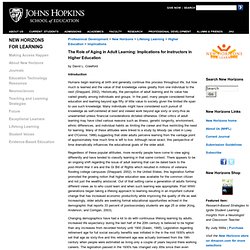
Crawford Introduction Humans begin learning at birth and generally continue this process throughout life, but how much is learned and the value of that knowledge varies greatly from one individual to the next (Sheppard, 2002). Historically, the perception of adult learning and its value has varied greatly among individuals and groups. Regardless of these popular attitudes, more recently people have come to view aging differently and have tended to classify learning in that same context. Changing demographics have had a lot to do with continuous lifelong learning by adults. An even more apparent demand for adult education is supported by research that suggests a twenty year old today can expect to make six to seven job changes over the course of a working career (Aslanian and Brickell, 1980). Physiological Aspects of Aging on Learning In 1927 Edward L. Understanding the Adult Learners Motivation and Barriers to Learning.
Characteristics of Adult Learners. Adult Literacy – Adult Motivation. In this article, Professor Alan Rogers draws on his thirty years of experience of the field to describe what he has learned about the motivation which drives many men and women to struggle to master the skills of reading and writing.
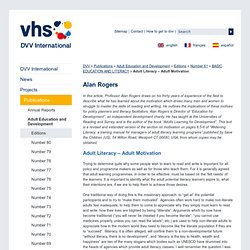
He outlines the implications of these motives for policy planners and literacy facilitators. Alan Rogers is Director of “Education for Development”, an independent development charity. He has taught at the Universities of Reading and Surrey, and is the author of the book “Adults Learning for Development”. This text is a revised and extended version of the section on motivation on pages 6:5-6 of “Widening Literacy: a training manual for managers of adult literacy learning programs” published by Save the Children (US), 54 Wilton Road, Westport CT 06680, USA, from whom copies may be obtained. Www.educationforthinking.org/sites/default/files/pdf/04-04DoChildrenAndAdultsLearnDifferently.pdf. Adults Learn Differently Than Children. Carolyn B.
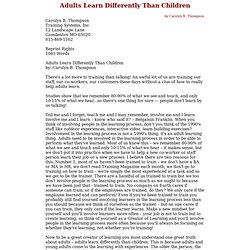
Thompson Training Systems, Inc. 12 Landscape Lane Camdenton MO 65020 815-469-1162 Reprint Rights 1083 Words Adults Learn Differently Than Children by: Carolyn B. Thompson There's a lot more to training than talking! Studies show that we remember 80-90% of what we see and touch, and only 10-15% of what we hear...so there's one thing for sure — people don't learn by us talking! Do children learn faster and easier than adults. 5 Essential Skills Needed by Adult Learners: Continuing Education Abilities Desired of Graduates by Employers. Employers considering an applicant for a position within their company require specific essential skills beyond completion of a college degree.
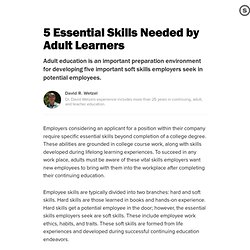
These abilities are grounded in college course work, along with skills developed during lifelong learning experiences. To succeed in any work place, adults must be aware of these vital skills employers want new employees to bring with them into the workplace after completing their continuing education. Employee skills are typically divided into two branches: hard and soft skills. Hard skills are those learned in books and hands-on experience. Hard skills get a potential employee in the door; however, the essential skills employers seek are soft skills. Soft Skills: Crucial Expertise Employers Seek in College Graduates The following are five essential skills employers seek in adults completing continuing education. Work EthicSkills – successful adult students have a strong work ethic, because academic success requires hard work and diligence.
Adult Education: Why You Need It and What You Need To Know. Why adult students drop out. In this section we will deal with the reasons why it is difficult for adult students to finish a language course and learn a foreign language successfully.
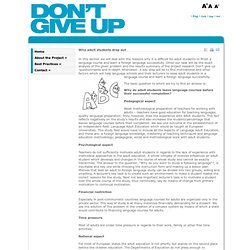
Other our task will be the exact analysis of the given problem and the results summary of the project research Don’t give up 'questionnaires and in-depth interviews'. A key step will be to find motivational and other factors which will help language schools and their lecturers to keep adult students in a language course and learn a foreign language successfully. The basic question to which we try to find an answer is: Why do adult students leave language courses before their successful completion? Pedagogical aspect Weak methodological preparation of teachers for working with adults – teachers have good education for teaching languages, quality language preparation; they, however, miss the experience with adult students. Psychological aspect Financial restriction Time pressure National aspect. Why Adults Want To Learn. As an adult, what drives you to learn?
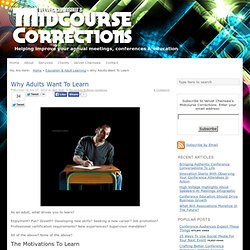
Enjoyment? Fun? Growth? Developing new skills? Seeking a new career? All of the above? The Motivations To Learn ASAE’s research, The Decision To Learn, states that the top two reasons people join nonprofit associations are: Education and Professional DevelopmentReceiving Cutting Edge Information According to ASAE’s The Decision To Learn, the driving extrinsic motivation for adults to learn is to increase their job status which then increases their income and social standing in their chosen profession. Knowing the latest research and how to apply it opens up new opportunities for career advancement. The driving intrinsic motivation for adults to learn is a general sense of accomplishment. In order to feed their personal passions about subjects that they have limited knowledge or experience, adults want solutions to their real-world problems and issues. Research Rants Or Relevant Solutions.